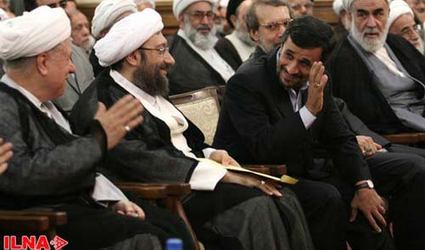IRANIANS PRETTY PSYCHED ABOUT UNIFYING ISLAM
 I posted theses quotes about Hamas – one from Larijani and the other from Ahmadinejad – on Is Iran‘s Fist Still Clenched? yesterday. But they’re worth reposting here so that maybe we can puzzle them out together. Because Sunnis and Shiites don’t cooperate, and yet here are Sunnis and Shiites seemingly cooperating. Mindbending:
I posted theses quotes about Hamas – one from Larijani and the other from Ahmadinejad – on Is Iran‘s Fist Still Clenched? yesterday. But they’re worth reposting here so that maybe we can puzzle them out together. Because Sunnis and Shiites don’t cooperate, and yet here are Sunnis and Shiites seemingly cooperating. Mindbending:
Iranian Parliament Speaker Ali Larijani on Sunday defended his country’s support for Hamas, during a high-profile visit to Cairo. Larijani told Egyptian President Hosni Mubarak that Teheran is proud of its “moral” support for Hamas. He also denied that Iran is undermining Egypt’s efforts to reconcile between Hamas and Fatah. The Iranian official called his meeting with Mubarak “constructive,” and noted that Iran and Egypt shared a “positive vision on bilateral relations,” according to Iranian Press TV.
And:
Iranian President Mahmoud Ahmadinejad on Sunday reiterated his support for Hamas, during a visit by the Palestinian group’s Damascus-based leader Khaled Mashaal, according to Iran’s official news agency. “The government and the people of Iran will always stand by the Palestinian resistance and the Palestinian people,” Ahmadinejad said during the meeting with Mashaal.
Larijani used similar language in February, saying “it’s an honor to support Hamas.” In March Iran confirmed that support by throwing a fundraising party for their Gaza proxies. In April month Egypt made clear that the two were linked, targeting Hamas as part of a broader anti-Iran regional push. And so on.
Of course there are 2007 papers outlining the full-blown Hamas/Iranian alliance, with Tehran’s financial and military support transforming Gaza into a de facto Iranian statelet. Quite the opposite from being stymied by Sunni/Shiite tensions, Iran is positioning itself as the unique unifying force that transcends those tensions. Historical tensions do exist in the Muslim world. But they’re the basis for Iran’s pan-Islamist identity not a barrier to it:
Driven by its desire to achieve the status of a world Islamic power, Iran is now a uniting force between Sunni and Shi’ite radical groups. This new bloc of Iranian allies not only poses a threat to the West, it challenges the moderate states of the Middle East, who used to fear a “Shiite Crescent” spanning from Iran through Lebanon. Threats of a crescent are now replaced by a wider fear of Iran-sponsored radicalism that spans the region. Indeed, the influence of Iranian radicalism knows no boundaries, thanks to Tehran’s increasingly pragmatic approach toward Sunni groups.
Liberal sophisticates who point to historical Sunni/Shiite dynamics as some kind of argument are – predictably – stalled at the beginning of a debate they think they’re ending. Which doesn’t stop the media from quoting them extensively. But at least it also makes them extra obnoxious!
Comments are closed.
